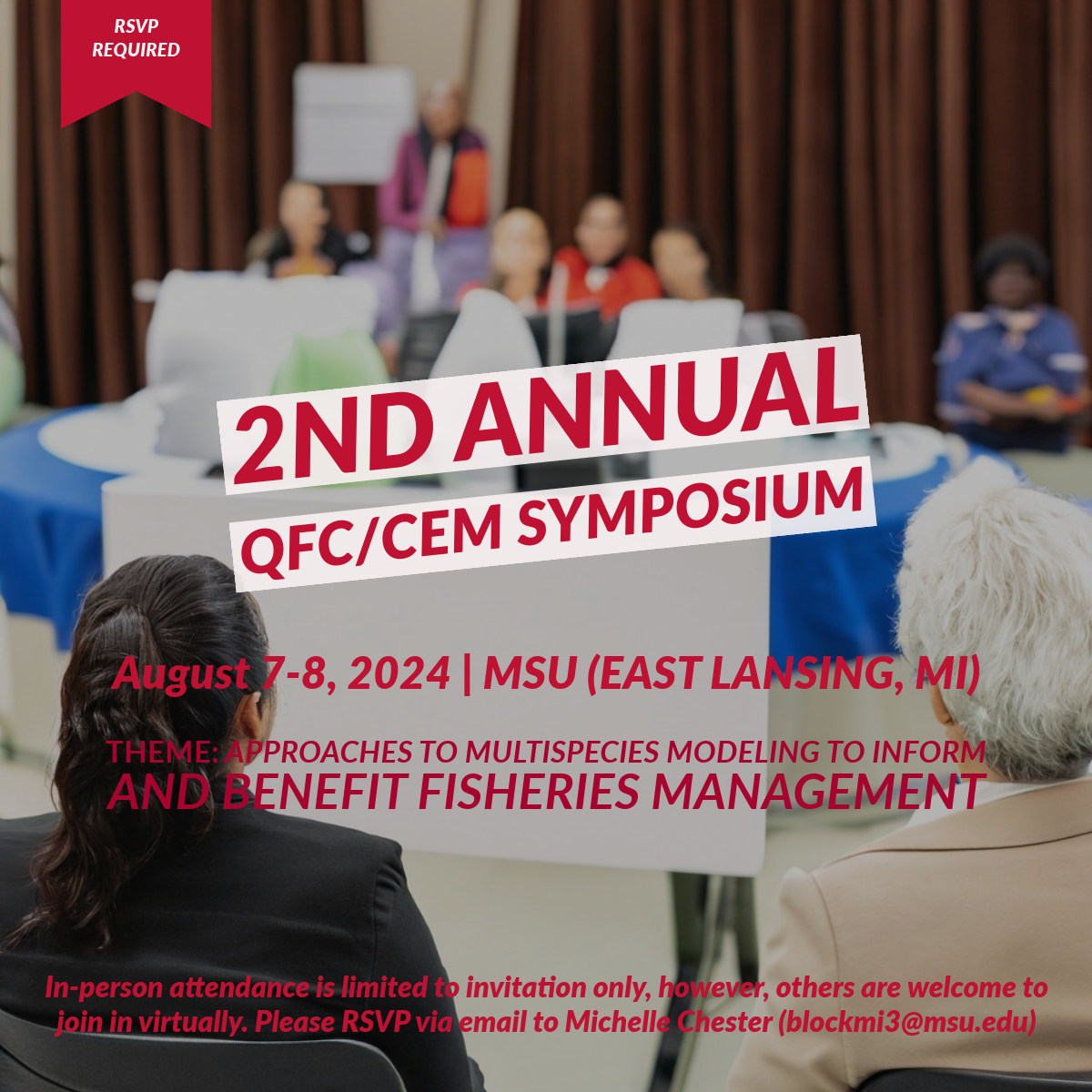Tune in to The Fisheries Podcast’s most recent episode featuring our own Dr. Joey Bernhardt, where she delves into her fascinating career path and shares the passions that drive her work.
Read MoreThe second joint symposium of the Quantitative Fisheries Center (QFC) and Centre for Ecosystem Management (CEM) will be held at Michigan State University on August 7-8, 2024, with the theme Approaches to Multispecies Modeling to Inform and Benefit Fisheries Management.
Read MoreWe are thrilled to congratulate Dr. Amanda Cicchino, Postdoctoral Fellow here at the Centre for Ecosystem Management, on being awarded an NSERC grant for her research pertaining to the impact of global warming on ectotherms, specifically freshwater fish in the Great Lakes basin.
Read MoreExtreme heat can affect everyone and everything. It can have profound effects on the Great Lakes ecosystem by altering water temperature and quality, promoting harmful algal blooms, and stressing aquatic and terrestrial wildlife. Here are just some of the ways you can be an environmental ally during extreme heat events.
Read MoreIn the dynamic landscape of ecology and evolution, embracing open science is no longer just an option—it's a necessity. As the movement towards transparency and data accessibility gains momentum, the skills associated with open science are becoming invaluable for budding ecologists and evolutionary biologists.
Read MoreA team of scientists, to include our own Dr. Joey Bernhardt, has secured a $250,000 grant over two years through the New Frontiers in Research Fund Exploration competition. Their project aims to track the northward migration of biting flies due to climate change and assess their impact on wildlife and human health in Arctic regions.
Read MoreWe are thrilled to announce that Dr. Kayla Hale, Postdoctoral Fellow here at the Centre for Ecosystem Management, is a recipient of one of this year’s National Science Foundation (NSF) Postdoctoral Research Fellowships for her proposal that promises to advance our understanding of ecological dynamics.
Read MoreThe Modelling Food Web Resilience in the Great Lakes working group recently met at the Centre for Ecosystem Management to focus on discussions around resilience, governance, and modelling in ecosystem management.
Read MoreIn a study led by Mx. Jade Dawson (and co-authored in part by our own Dr. Kevin McCann), we delve into the intricate world of freshwater food webs to uncover the resilience of Canadian fisheries in the face of environmental challenges.
Read MoreAt its core, food web modelling aims to capture the structure and dynamics of ecological networks, where species are interconnected through feeding relationships. These models typically use equations to describe population dynamics, predator-prey interactions, and energy transfer processes.
Read MoreWe are thrilled to introduce our newly appointed Strategic Advisory Board (SAB) at the Centre for Ecosystem Management (CEM). This esteemed board comprises experts from diverse backgrounds, all committed to advancing ecosystem management within the Great Lakes basin.
Read MoreWe’re not the only ones excited about this recent study published in the Canadian Journal of Fisheries and Aquatic Sciences (carried out with the assistance of the CEM’s Director, Dr. Kevin McCann)….!
Read MoreOntario's conservation authorities are facing pivotal changes that could reshape their role in environmental oversight. The recent amendments to the Conservation Authorities Act have granted the Minister of Natural Resources new powers to issue development permits without the need for a review by conservation authorities.
Read MoreEcosystem management and ecosystem-based management (EBM) are both approaches that aim to conserve and restore ecosystems and their services, but they have some differences in their scope, principles, and applications.
Read MoreUnder what conditions can trophic diversity relationships be eroded? Our Scale Invariance in Aquatic Ecosystems working group seeks to answer that very question as we study patterns in trophic diversity relationships within aquatic ecosystems where species turnover is often significant.
Read MoreIn the realm of science, women continue to break barriers and make significant contributions, particularly in fields traditionally dominated by men. At the University of Guelph, a hub of academic excellence, the female students in our labs are at the forefront of discovery.
Read MoreExciting discoveries emerge from an investigation into the impact of climate change on five key freshwater fish species! A new study published in the Canadian Journal of Fisheries and Aquatic Sciences and carried out with the assistance of the CEM’s Director, Dr. Kevin McCann, looks at how freshwater fish body sizes respond to warming.
Read MoreOur Structural Early Warning Signals in Aquatic Ecosystems working group is investigating how the basic connections between the organization and operation of ecosystems (such as the arrangement of different life stages and the structure of food webs) can be disrupted by global changes.
Read MoreThe Limnotron facility, situated within the Biodiversity Institute of Ontario at the University of Guelph, features a collection of six sizable tanks - originally beer vats - allowing for the creation of experimental ecosystems such as a controlled lake environment.
Read MoreThe University of Guelph has once again confirmed its place as one of the top research universities in Canada in an annual survey.
For the ninth straight year, U of G has claimed second spot among Canadian comprehensive universities in the 2023 Research Infosource Inc. ranking of Canada’s Top 50 Research Universities.
Read More



















